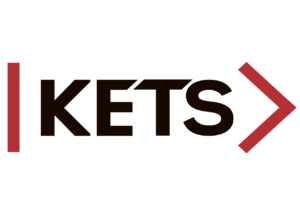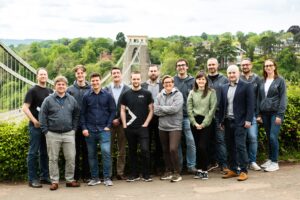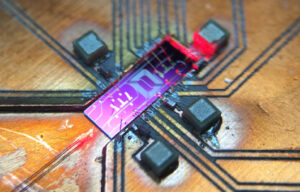The company
KETS Quantum Security Ltd is an award-winning start-up with a mission to enable future-proofed, ultra-secure communications for devices and networks through the commercialisation of integrated photonic technologies. The company’s chip-scale Quantum Key Distribution (QKD) device has low size, weight and power (SWaP) requirements and is manufactured in standard semiconductor foundries, meaning it can be easily integrated into modern electronics and is therefore a flexible and scalable option for cryptographic key distribution. The device enables equipment manufacturers to build a variety of new quantum secured products, with the integration of KETS’ chips, which can be utilised for secure communications in data-sensitive sectors such as finance, energy and defence. KETS’ patented product range also includes a high-speed Quantum Random Number Generator which can provide Gbits/sec cryptographic-grade entropy at low cost and with low SWaP requirements, meaning it can be seamlessly integrated and applied in a range of devices and systems.
The partnership with the Hub

The KETS team (Image credit: KETS Quantum Security Ltd)
KETS is a direct spinout of the Quantum Communications Hub, created by investigators and researchers involved in the work of the Hub during the first phase of the National Programme. The founders of the company, which was created in 2016, were based at the University of Bristol and led the world’s first chip-to-chip demonstration of QKD by the Hub. The demonstration saw cryptographic keys being securely exchanged using microchip circuits, just a few millimetres in size, that were able to control, communicate and detect quantum states of light. Crucially, the chips were created using components and manufacturing processes already used within the telecommunications industry, therefore paving the way for the large-scale integration of QKD devices within conventional consumer devices and telecommunications networks. Having built a prototype QKD device as part of the Hub programme, KETS was created as a start-up, with support from the Hub, in order to focus on the commercialisation of the devices. Since then, the company has remained closely involved with the Hub, collaborating on many aligned projects and leveraging access to the UK Quantum Network to test and validate their devices.
Looking ahead
KETS has been a quintessential entrepreneurial success story and to a large degree the inspiration behind the University of Bristol’s QTEC (Quantum Technology Enterprise Centre) innovation incubator scheme. This success is manifested twofold – through numerous industry awards and realisation of funding from various funding rounds. In 2017, KETS was announced as the first of three winners of the prestigious UK TEAC (Telecom Infra Project Ecosystem Acceleration Centre) initiative; a year later, in 2018, they were finalists in the Best Tech Start-up category in the Business Leader Go:Tech Awards. In 2019, KETS was named the UK’s Most Innovative Small Cyber Security Company of the Year at Infosec Europe and won the regional award for the Barclays’ Start-up Entrepreneur of the Year. Since then, many more awards have been won, including Best Cyber Company at the SPARKies 2020.
In parallel, the company has fast become a key collaborator in many large-scale, strategic projects in the area of quantum secure communications, both within the UK and internationally. In partnership with global companies Airbus and ID Quantique, and with the Universities of Oxford and Bristol, KETS demonstrated the deployment of their QKD chips to improve the security of Unmanned Aerial Vehicles (UAVs), such as drones, in the ‘Q-DOS Light’ project, funded by Innovate UK. UAVs are increasingly being used commercially, but their uptake has been hindered due to the overallocation of the RF spectrum and concerns around their ability to securely transmit sensitive data. Q-DOS Light tackled the rapidly growing problem of delivering a low-weight, high-speed, free-space optical communication system with highly secure quantum encryption and eavesdropping detection. With a 2kg weight limit, KETS managed to fit a quantum transmitter within a 750g package. Further, KETS demonstrated secret key rates during bright daylight over 100m channels with as much as 25dB of loss.
Building on their work in the Q-DOS Light project, KETS continue to work with Airbus, along with the University of Strathclyde and the Satellite Applications Catapult, on the Innovate UK funded project ‘Viable Satellite Free-Space Optical Quantum Key Distribution Technologies (ViSatQT)’. Satellite QKD is likely to be a critical part of a global quantum communications infrastructure as it will enable the distribution of secure keys over longer distances than optical fibre networks can facilitate. However, a hurdle for the commercialisation of satellite QKD has been that early prototype systems could only operate at night-time in clear sky conditions. ViSatQT aims to overcome these issues by accelerating the commercialisation of satellite QKD technologies and creating a roadmap for QKD satellite services which can operate at any time of day and in a range of weather conditions.
The KETS team are also working alongside a number of other Hub partners on two major projects funded through the Industrial Strategy Challenge Fund: the AQuaSec project (with Hub partners Toshiba, BT, NPL, and the Universities of Cambridge, Glasgow, Sheffield, Heriot-Watt, Queen’s University Belfast and Royal Holloway) is aiming to develop new quantum-resistant algorithms while also implementing new ultra-compact QRNG and QKD prototypes based on photonic integrated circuit (PIC) technology. The ‘Assurance of Quantum Random Number Generators’ project (alongside Hub partners NPL, CryptaLabs, IDQ, NuQuantum, Toshiba, and the Universities of Kent and York) aims to address the need for authoritative certification of the unique randomness produced by QRNGs, currently a major barrier to the commercialisation and industrial exploitation of the technology.
Internationally, KETS is leading the UK side of the ‘Building a standardised quantum-safe networking architecture’ project which is jointly funded by Innovate UK and the National Sciences and Engineering Research Council of Canada (NSERC), and which includes the Institute for Quantum Computing at the University of Waterloo, the University of Bristol, Crypto4A, the Canadian Communications Security Establishment, QEYnet Inc and RHEA Group. The aim of this project is to combine quantum-aware networking architectures and software systems developed independently in Canada at the University of Waterloo and in the UK by the University of Bristol, as well as incorporate QKD and post-quantum cryptography technologies and designs from both countries in order to develop a Canadian-UK secure network built on the security principles of quantum-safe technologies.

KETS’ integrated quantum photonics chip (Image credit: KETS Quantum Security Ltd)
KETS is currently focused on delivering first products, development kits, that will enable them to deliver key first trials with a number of blue chip organisations they’re currently engaged with across a range of sectors including telecommunications, governments, defence and finance. This will demonstrate the technology in real-world applications and environments and help these clients to secure their systems and data with quantum-safe crypto solutions. This is the first step towards delivering world-wide quantum-secure communications.
In order to support their involvement in the ParisQCI project, KETS has recently opened their first international office in Paris, France. This project will roll out one of the first national testbeds, envisioned by the upcoming larger QCI project, across the Paris region over the next 2 years. Working with Orange, Thales, and a number of other key partners, KETS will be supplying the quantum encryption systems that will protect this network.
Speaking about KETS’ partnership with the Hub, KETS’ CEO, Chris Erven, said:
“The Quantum Communications Hub was fabulously supportive of us, first as academics with our world first chip-to-chip QKD experiments, and then even more so when we created KETS to commercialise this technology and get it out into the real world protecting our private information. We continue to be proud industrial partners of the Quantum Communications Hub which enables us to access the UK national quantum network, keep abreast and contribute to the latest cutting-edge quantum communications research, and grow our team from the wonderful talent the Hub is producing. With the support of the Hub, the UK’s National Quantum Programme, and the wider quantum community we’re realising our dream of providing a quantum-safe future.”
 Hub Director, Professor Tim Spiller said:
Hub Director, Professor Tim Spiller said:
“Chip-based quantum photonics provides a clear pathway towards commercialisation and wide take-up of quantum communications and related technologies. Supporting the emergence of KETS has been a major Hub success in this sector. We look forward to a continuing collaboration with KETS on future generations of chip-based technologies.”



